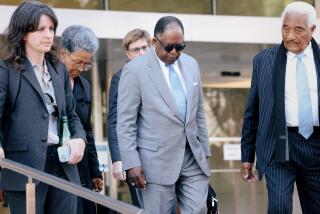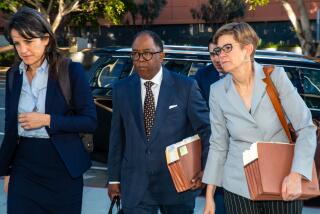Judge in Trial of Mayor Wants Final Arguments Delivered Today
- Share via
Although several major legal issues remain to be resolved in Mayor Roger Hedgecock’s trial, Superior Court Judge William L. Todd Jr. told attorneys in the case on Tuesday that he plans to begin closing arguments this afternoon.
Assistant Dist. Atty. Richard D. Huffman and Hedgecock’s attorneys spent their second complete day Tuesday debating proposed jury instructions before Todd--a lengthy, often tedious process that will resume this morning. The instructions, which Todd will deliver to the jury just before it begins deliberations, concern key points of law and evidence in the mayor’s felony perjury and conspiracy trial.
Also Tuesday, Hedgecock’s co-counsel, Sheldon Sherman, gave a brief preview of the defense’s closing arguments when he suggested that the jury could decide that possible improprieties in Hedgecock’s 1983 campaign were caused by the “overzealousness” of political consultant Tom Shepard, not by any wrongdoing on Hedgecock’s part.
Anticipating that the debate over jury instructions might conclude this morning, Todd told the prosecutor late Tuesday to plan to deliver his closing argument this afternoon.
“I can’t!” an obviously exasperated Huffman exclaimed.
“You may be up all night,” Todd said, nodding.
“I’ve been up a lot of nights,” Huffman responded. “With all due respect, I’m working as hard as I can. But I can’t rationally . . . prepare until we settle these (legal) issues.”
Todd has yet to rule, for example, on vital instructions concerning the definition of perjury and the defense’s central argument that the prosecution is misinterpreting state election laws by treating the overhead expenses of Tom Shepard & Associates as an allegedly illegal campaign contribution. Until Todd decides “what the law is” on those points, Huffman said, “I’ve got a (closing) argument . . . but I’ve got a hole in it.”
Saying he needed “time to assimilate the law,” Huffman said he had hoped that Todd would give him at least one day after the conclusion of the jury instruction discussions to revise his closing argument.
Todd, however, promised Huffman only that “I won’t make you start without at least several hours’ (notice).”
“It’s the judge’s decision,” Huffman later said, wearily, outside the courtroom. “We’re just the fighters and we have to be here when the bell rings. And I’ll be here.”
The expected length of the two sides’ closing remarks, combined with Todd’s policy of not having the trial in session on Fridays, means that the case probably will not go to the jury until early next week.
Most of the debate during Tuesday’s session (the jury was out of the courtroom) focused on two proposed jury instructions --one concerning the prosecution’s contention that Hedgecock may have committed a conflict of interest in 1982 when he was a county supervisor, and the other involving the defense’s position on the overhead expenses of Shepard’s firm.
The alleged conflict of interest stems from Hedgecock’s 1982 votes on proposals to develop the County Administration Center’s bayfront parking lots. The prosecution argues that Hedgecock should have disqualified himself from voting on the project because one of the bidders for the lucrative contract, investment counselor Harvey Schuster, had paid a $500 legal bill for Hedgecock in 1981 and had promised him a $24,000 loan in March, 1982. Huffman also has suggested that Hedgecock intentionally omitted the $500 gift from Schuster on his financial disclosure statements to conceal the alleged conflict of interest.
Prosecutors urged Todd to instruct the jurors about a state conflict-of-interest statute stating that it is a crime for any officeholder to participate in a governmental decision that “will have a material financial effect . . . on any source of income aggregating $250 or more in value provided to, received by or promised to the public official within 12 months prior to the time when the decision is made.”
Defense co-counsel Sheldon Sherman, however, argued that Hedgecock was not guilty of a conflict of interest because he was unaware that Schuster had paid the legal bill and he never accepted the proposed loan. Although Hedgecock supported Schuster’s project at a preliminary stage in the bidding process, he ultimately voted for a different proposal.
But Deputy Dist. Atty. James Hamilton contended that the incident was “indicative of a scheme . . . and motive” that supports the prosecution’s theory in this case --namely, that Hedgecock allegedly conspired with former J. David & Co. principals Nancy Hoover and J. David (Jerry) Dominelli to illegally funnel tens of thousands of dollars into his 1983 campaign via Shepard’s firm, and then falsified his financial reports to conceal those transactions.
Todd sided with the prosecution, saying that jurors “must determine whether they infer” that the alleged conflict of interest demonstrates that Hedgecock was customarily inclined to “hide (his) financial betterment” by falsifying his disclosure statements.
The proposed instruction relating to the overhead expenses of Tom Shepard & Associates represents the cornerstone of the defense’s case. Indeed, at one point, Sherman said, “This is the defense.”
In rebuttal to prosecutors’ charge that Hedgecock received illegal contributions from Shepard’s firm in the form of free staff time and other unreimbursed services, Hedgecock attorney Michael Pancer has argued that those services represented the firm’s overhead expenses, which, under state law, are not considered contributions.
Sherman asked Todd to approve an instruction pointing out that the state law specifies that the “overhead or normal operating expenses” of a consulting firm are not considered political contributions.
Huffman, however, argued that the defense’s interpretation of the law would allow political consultants to funnel illegal aid to candidates “just by calling it overhead.”
“This would create a loophole which a freight train could drive through,” Huffman argued.
Todd rejected the defense’s proposal, but said he would review a revised proposal today.
While the defense does not concede that Hedgecock received improper aid in his 1983 campaign, Sherman continued Tuesday the defense’s persistent effort to put distance between the mayor and any possible wrongdoing.
The jury could decide, Sherman argued, that Shepard “in his overzealousness . . . made expenditures beyond the scope” of his firm’s contract with Hedgecock’s campaign committee without Hedgecock’s knowledge.
In approving instructions relating to that theory, Todd agreed that the defense “should be allowed . . . to argue that Hedgecock didn’t know” about any improper expenditures or contributions.
More to Read
Sign up for Essential California
The most important California stories and recommendations in your inbox every morning.
You may occasionally receive promotional content from the Los Angeles Times.












